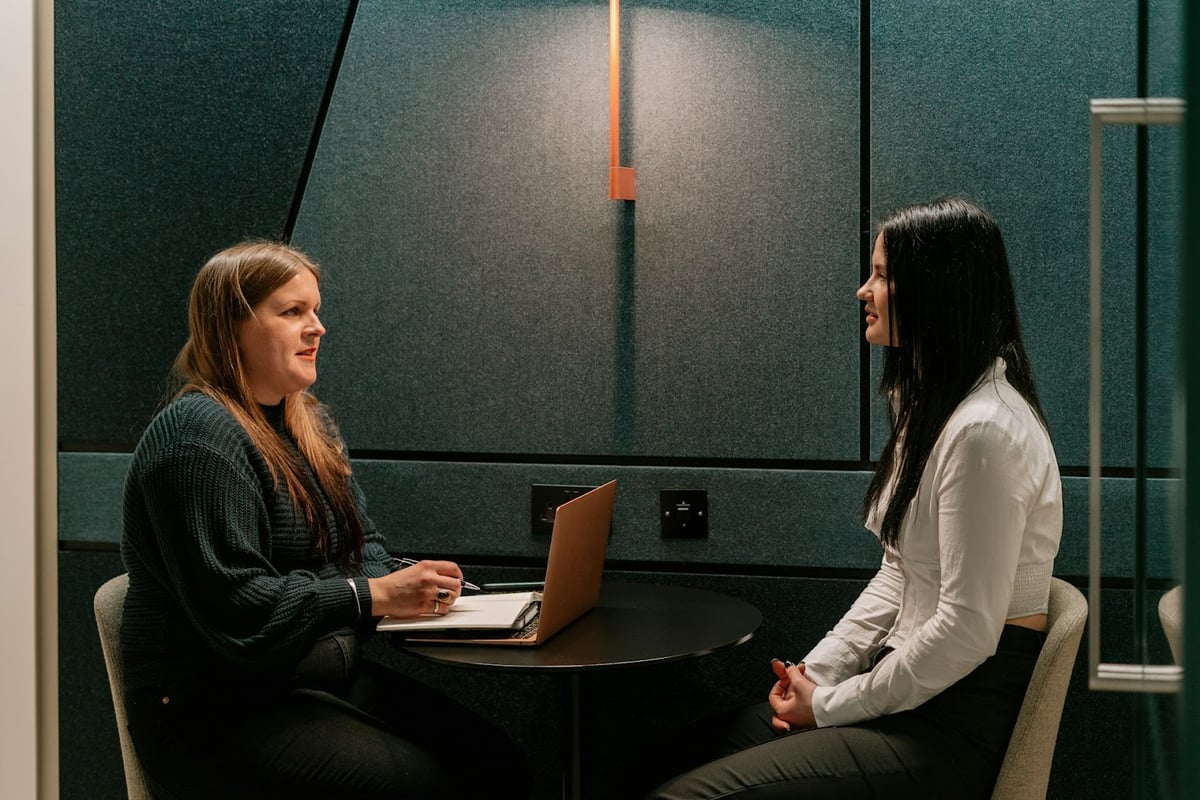Okay, real talk.
That moment when an interviewer leans in and asks, 'Tell me about a time you failed.'
Your stomach drops, your mind races, and you're scrambling to find an answer that doesn't make you sound like a total mess.
It's tough. We do everything we can to steer away from failure, and here we are trying to score a new job, and they're shining a light right into it.
But that's not actually a problem. In fact, it's an opportunity to shine.
You see, employers aren't looking for perfect robots. They want to know how you handle setbacks, how you learn, how you grow. Mistakes and problems are always going to happen. They're inevitable.
It's how you deal with them that counts, and that's exactly what's going on here.
So, let's ditch the polished facade and get real about failure. We'll break down why this question matters, how to frame your answers, and how to turn a potentially awkward moment into a chance to shine.
Let's go.
Why interviewers say "tell me about a time you failed."

So, why do employers put you through the wringer? It's not about making you sweat, trust me. It's about seeing the real you. Let's break down what they're actually looking for:
- Your reaction to failure: Do you crumble, or do you bounce back? They want to see maturity and a willingness to learn.
- Your self-awareness: Can you own your mistakes? Recognizing and admitting errors shows you're grounded. Only those riddled with ego think they make no mistakes.
- Your pressure handling: How do you stay composed when things get tough? Resilience is key.
- Your risk assessment: Are you afraid to take chances, or do you see failure as a stepping stone? They want to know you can handle calculated risks.
See? It's not a trap; it's an opportunity. They're trying to understand your character, your growth mindset. In 2025, those qualities are gold.
What do professionals think about "Tell me about a time you failed"
To really get a handle on this question, let's hear from some professionals who've been on both sides of the interview table.
- Salina Hoque, Director of HR and Community Engagement: 'This isn't about embarrassment; it's about resilience. We're looking at how you overcome difficulties. Explain the 'why' and the 'how' of your learning process.'
- Steve Pritchard, Human Resource Consultant: 'Practice is key. The more authentic you are, the better. Own your failures, and show how they've shaped your work ethic.'
- Laurie Richards, CEO of LR&A: 'Take responsibility. Use superlatives to highlight a specific mistake, find the silver lining, and, most importantly, show what you learned. Actions speak louder than words; demonstrate how you've applied those lessons.'
These insights highlight a consistent theme: it's not the failure itself that matters, but the lessons learned and the subsequent growth. In 2025, these are the qualities that set candidates apart.
They want to see that you have the capacity for introspection and that you are constantly striving to improve.
How to talk about failure in an interview

You can see why this question is so important, but how do you actually master the answers to this important question? All without crumbling into a puddle of self-doubt?
Here's the blueprint:
- Choose a real and relevant failure: Don't try to sugarcoat it or invent a fake scenario. Pick a genuine setback that's not too catastrophic but relates to the job you're applying for. More on this shortly.
- Be specific: Don't be vague. Clearly describe the situation, the task at hand, and the specific skill involved. Paint a vivid picture for the interviewer.
- Use the STAR method: This is your secret weapon. Frame your response using the Situation, Task, Action, and Result framework. It keeps your answer organized and impactful.
- Focus on growth: This is where you shine. Emphasize the lessons learned, the changes you made, and the improvements you implemented. Show them you're a learner.
- Maintain a positive tone: Take ownership, but don't dwell on the negative. Show enthusiasm for the lessons learned and your willingness to adapt.
It's this kind of approach that enables you to navigate this question with confidence and demonstrate your skills, expertise, and emotional intelligence.
Remember, it's not about being perfect; it's about showing how you handle challenges and emerge stronger on the other side.
Tips for answering "tell me about a time you failed" interview questions
Here's the thing: even with the best blueprint, a little extra polish can go a long way. So, consider these pro tips to make your answer truly shine:
- Have sample answers ready: Don't wing it. Prepare a few examples beforehand, ensuring they're relevant, detailed, and showcase your growth.
- Rehearse, rehearse, rehearse: Practice makes perfect. The more comfortable you are with your response, the more confident you'll sound in the interview.
- Be upfront about the mistake: Don't try to hide it or downplay it. Own your actions and show that you're not afraid to address your shortcomings.
- Seek feedback: Ask colleagues for honest feedback on past errors. This can give you valuable insights and help you craft a stronger response.
- Get in the right mindset: Visualize success. Believe in your ability to answer this question effectively, and don't let self-doubt creep in.
- Draft and refine: Write out your story beforehand, ensuring it's clear, concise, and impactful. Then, practice delivering it naturally.
- Highlight your lessons: Don't just mention what you learned; show how you've applied those lessons and improved your performance.
- Don't memorize: Practice, but don't memorize your answer verbatim. You want it to sound natural and conversational, not robotic.
It sounds like a lot, but it's not once you get the flow of it. Try practising it in front of a mirror and you'll see how quickly you can pick it up.
This kind of practice will effectively allow you to answer the question while demonstrating your preparedness, self-awareness, and commitment to growth.
How to choose a failure to discuss: A comprehensive guide
This is a crucial step, so let's break it down into actionable advice:
1. Prioritize trivial failures
- Don't overshare: Avoid major blunders that make you seem incompetent or unreliable. Remember, the goal is to show growth, not raise red flags.
- Focus on manageable setbacks: Think of a time when you faced a challenge, made a mistake, but ultimately learned from it. These "smaller" failures often provide the best learning opportunities.
- Example: Instead of discussing a time you lost a major client, talk about a time you missed a deadline on a smaller project and how you improved your time management skills as a result.
2. Keep it relevant
- Align with the job description: Analyze the skills and qualities emphasized in the job description. Choose a failure that demonstrates your ability to learn and grow in those specific areas.
- Showcase transferable skills: Even if you don't have a direct example from a previous role, choose a failure that highlights transferable skills like communication, problem-solving, or teamwork.
- Example: If you're applying for a leadership role, discuss a time you struggled to delegate tasks effectively and how you developed your leadership skills to overcome that challenge.
3. Show your growth
- Focus on the learning process: The interviewer wants to see how you handle setbacks and what you take away from them. Emphasize the lessons learned and the positive changes you implemented.
- Demonstrate resilience: Choose a failure that showcases your ability to bounce back, adapt, and improve. This highlights your resilience and growth mindset.
- Example: Discuss a time you received critical feedback on a project. Explain how you took that feedback constructively, adjusted your approach, and achieved better results in the future.
4. Be authentic
- Choose a real story: Don't fabricate a failure. Interviewers can often spot insincerity. Your story should be genuine and relatable.
- Connect to workplace skills: Even if the failure isn't directly related to the job, connect it to essential workplace skills like communication, teamwork, or adaptability.
- Example: If you're applying for a marketing role, you could discuss a time you organized a community event with low turnout. Explain what you learned about target audience analysis and how you applied those lessons to future events.
The aim here is to select a failure that presents you in a positive light, demonstrates your capacity for growth, and aligns with the requirements of the job.
How to prepare your answer - Turning failure into a success story

Here's where you transform a potentially negative experience into a compelling narrative that highlights your strengths and growth.
1. Mental preparation: Believe in your story
- Embrace your failure: Don't approach this question with dread. View it as an opportunity to showcase your resilience and growth mindset.
- Focus on the positive: Remember, the interviewer isn't trying to make you feel bad. They want to see how you handle challenges and learn from them.
- Project confidence: Even if you're nervous, project a sense of calm and composure. Believe in your ability to answer this question effectively.
2. Reflect deeply: Choose wisely
- Consider the consequences: Think about the potential impact of your chosen failure. Avoid examples that could raise serious concerns about your judgment or work ethic.
- Highlight relevant qualities: Select a failure that showcases qualities relevant to the job, such as problem-solving, teamwork, or adaptability.
- Focus on self-awareness: Choose a story that demonstrates your ability to recognize your mistakes, take responsibility, and learn from them.
3. Craft a compelling narrative
- Show, don't just tell: Use vivid language and specific details to bring your story to life. Engage the interviewer with a clear and concise narrative.
- Structure your response: Use the STAR method (Situation, Task, Action, Result) to ensure your answer is organized and impactful.
- Emphasize your wins: Don't just focus on the failure itself. Highlight the positive outcomes, the lessons learned, and the improvements you made.
4. Practice and refine
- Role-play: Practice with a friend or family member to get comfortable with your answer and receive feedback.
- Pay attention to delivery: Speak clearly and confidently. Maintain eye contact and use positive body language.
- Time yourself: Ensure your answer is concise and to the point. Aim for a response that lasts around 2-3 minutes.
5. Seek feedback from colleagues
- Gain perspective: Ask colleagues who were involved in the situation for their honest feedback. This can help you see the situation from different angles.
- Identify blind spots: Colleagues can often provide insights you may have missed, helping you craft a more comprehensive and insightful response.
- Refine your story: Use their feedback to refine your narrative and ensure it accurately reflects the situation and your role in it.
By following these steps, you'll transform a potentially awkward question into an opportunity to showcase your strengths, resilience, and growth mindset. Remember, it's not about being perfect; it's about demonstrating your ability to learn from your mistakes and emerge stronger on the other side.
The STAR technique and how to use it
The STAR technique is a powerful tool for structuring your response to behavioral interview questions like "Tell me about a time you failed." It helps you provide a clear, concise, and compelling narrative that showcases your skills and experience.
STAR stands for:
- Situation: Describe the context of your story. Set the scene and provide relevant background information.
- Task: Explain the challenge or task you were facing. What was your role, and what were you responsible for?
- Action: Detail the specific actions you took to address the situation. What steps did you take and why?
- Result: Describe the outcome of your actions. What were the results, both positive and negative? What did you learn from the experience?
How to use the STAR technique:
- Research: Before your interview, research common behavioral interview questions and identify relevant experiences from your past that you can use to answer them.
- Prepare: Structure your stories using the STAR method. This will help you remember the key details and deliver a clear and concise response.
- Listen: During the interview, listen carefully to the question and choose the most relevant story from your prepared examples.
- Focus: Stick to the point and avoid rambling. Use the STAR framework to keep your answer focused and organized.
- Reflect: Conclude your answer by reflecting on what you learned from the experience and how it has helped you grow.
Example Using STAR for "Tell Me About a Time You Failed":
- Situation: "In my previous role as a marketing coordinator, I was responsible for managing social media campaigns for a new product launch."
- Task: "My goal was to increase brand awareness and generate leads through targeted social media advertising."
- Action: "I developed a comprehensive social media strategy, created engaging content, and launched targeted ad campaigns. However, I underestimated the importance of A/B testing and didn't allocate enough time for it."
- Result: "As a result, the initial ad campaigns didn't perform as well as expected. I quickly realized my mistake, implemented A/B testing, and analyzed the data to optimize the campaigns. Ultimately, we exceeded our lead generation goals by 15%, and I learned a valuable lesson about the importance of data-driven decision-making."
By using the STAR technique, you can provide a structured and compelling response that demonstrates your ability to learn from your mistakes and achieve positive outcomes. Remember, it's not about being perfect; it's about showing that you're a continuous learner who can turn setbacks into opportunities for growth.
Using STAR for "Tell Me About a Time You Failed": Sample answers
Seeing the STAR method in action can make all the difference. So, let's explore a few sample answers that showcase how to effectively discuss failure in an interview:
Sample #1: The overly ambitious project
- Situation: "In my previous role at a tech startup, I led a project to develop a new mobile app feature. We were under pressure to deliver quickly and impress investors."
- Task: "My task was to manage the development process, ensure quality, and meet the tight deadline."
- Action: "I was overly ambitious with the initial timeline and underestimated the complexity of the feature. As a result, we missed the deadline by a few weeks."
- Result: "I took full responsibility for the delay, communicated transparently with stakeholders, and implemented a revised project plan with more realistic deadlines. We successfully launched the feature, and I learned a valuable lesson about setting realistic expectations and managing scope creep."
Sample #2: The misinterpreted client needs
- Situation: "As a freelance marketing consultant, I was hired by a small business to develop a social media strategy."
- Task: "My task was to understand their target audience, create engaging content, and increase their online presence."
- Action: "I made assumptions about their target audience based on my previous experience, but I didn't conduct thorough enough research. As a result, the initial content didn't resonate with their actual audience."
- Result: "I acknowledged my mistake, conducted in-depth audience research, and revised the content strategy. The client was happy with the updated approach, and I learned the importance of thorough research and client communication."
Sample #3: The ineffective delegation
- Situation: "As a team leader, I was responsible for delegating tasks and managing a project with a tight deadline."
- Task: "My task was to ensure that all team members were effectively utilized and that the project was completed on time."
- Action: "I struggled to delegate effectively and micromanaged some team members, which led to confusion and frustration."
- Result: "I recognized my mistake and sought feedback from my team. I learned to trust their abilities, delegate more effectively, and provide clearer instructions. The project was completed successfully, and I developed stronger leadership skills."
Mistakes to avoid when answering "Tell me about a time you failed"
Even with the best intentions, it's easy to make mistakes that could undermine your answer and leave a negative impression. So, let's shed light on some common blunders to avoid:
- Don't evade the question: Claiming you've never failed makes you seem either dishonest or lacking in self-awareness. Everyone makes mistakes; own yours.
- Avoid risky examples: Don't choose a failure with severe consequences or one that reflects poorly on your judgment or work ethic.
- Keep it concise: Don't ramble or provide unnecessary details. Your answer should be clear, concise, and focused on the key takeaways.
- Don't blame others: Take responsibility for your actions. Blaming others makes you seem unprofessional and lacking in accountability.
- Show how you learned: Don't just mention the failure; emphasize the lessons learned and the steps you took to improve.
- Avoid memorization: Practice your answer, but don't memorize it verbatim. You want to sound natural and conversational, not robotic.
- Don't fake a story: Be authentic. Choose a real-life failure that you can connect to workplace skills and use to demonstrate your growth.
By avoiding these common mistakes, you'll ensure that your answer is honest, insightful, and reflects positively on your character and capabilities. Remember, the goal is to showcase your ability to learn and grow from setbacks, not to raise red flags or create doubts about your suitability for the role.
Common variations of the "time you failed" interview question

Interviewers often like to explore different facets of your experience with failure. Here are two common variations to be prepared for:
1. "Tell us about a time you identified mistakes that were overlooked"
This question assesses your ability to handle failure in others. It's about teamwork, empathy, and constructive feedback.
- Focus on collaboration: Describe how you approached the situation with a focus on solutions and team cohesion.
- Highlight your communication skills: Explain how you communicated the mistake clearly and respectfully, without placing blame.
- Emphasize the positive outcome: Show how your actions led to a positive resolution and improved team performance.
Example: "In a previous project, I noticed a discrepancy in the data analysis that could have impacted our results. I approached my colleague privately, explained my concerns constructively, and offered to help find a solution together. We collaborated to correct the error, and the project was a success. This experience taught me the importance of open communication and collaborative problem-solving."
2. "Tell us about a time you had to deliver disappointing news"
This question explores your communication skills, diplomacy, and ability to handle challenging situations.
- Focus on Clarity and Empathy: Describe how you delivered the news with sensitivity and clarity, considering the recipient's perspective.
- Highlight Your Problem-Solving Skills: Explain how you addressed the situation proactively, offering solutions or alternatives.
- Demonstrate Professionalism: Show how you maintained composure and professionalism, even in a difficult situation.
Example: "In a previous role, I had to inform a client that we wouldn't be able to meet a project deadline due to unforeseen circumstances. I contacted the client immediately, explained the situation honestly and transparently, and offered a revised timeline with alternative solutions. While the client was initially disappointed, they appreciated my honesty and proactive approach. We successfully completed the project, and I learned the importance of clear communication and managing expectations."
By preparing for these variations, you'll demonstrate your ability to handle various situations related to failure, showcasing your adaptability, emotional intelligence, and commitment to teamwork and positive outcomes.
It's not just about your own failures; it's about how you perceive and respond to failure in others and how you navigate challenging situations with professionalism and grace.
Answering the Behavioral Question "Tell Me About a Time You Failed" with MentorCruise
Preparing for behavioral interview questions can be tough. It requires introspection, self-awareness, and the ability to articulate your experiences in a clear and concise way. That's where MentorCruise comes in.
Here's how MentorCruise can help:
- Expert guidance: Our experienced mentors have been on both sides of the interview table. They can provide personalized guidance and feedback on your answers, helping you refine your stories and delivery.
- Mock interviews: Practice makes perfect. With MentorCruise, you can participate in mock interviews with your mentor, simulating the real interview experience and getting valuable feedback on your performance.
- Targeted coaching: Our mentors can help you identify your strengths and weaknesses, develop effective strategies for answering tough questions, and build confidence in your interview skills.
- Personalized feedback: Get specific and actionable feedback on your answers, including your choice of examples, your use of the STAR method, and your overall delivery.
- Industry insights: Our mentors have deep industry knowledge and can provide valuable insights into the specific expectations and challenges of your target role and company.
By working with a MentorCruise mentor, you'll gain the confidence and skills you need to:
- Choose the right failure to discuss: Your mentor can help you select an example that showcases your strengths and aligns with the job requirements.
- Craft a compelling narrative: They can guide you in structuring your answer using the STAR method and ensuring it's clear, concise, and impactful.
- Practice your delivery: Through mock interviews and feedback sessions, you'll refine your delivery and project confidence and authenticity.
- Handle variations of the question: Your mentor can help you prepare for common variations, such as discussing failure in others or delivering bad news.
- Ace the interview: With thorough preparation and expert guidance, you'll be well-equipped to handle this challenging question and impress your interviewer.
Don't let the fear of discussing failure keep you from landing your dream job. With MentorCruise, you'll have the support and guidance you need to turn this potential challenge into a powerful opportunity to showcase your growth, resilience, and potential.
Ready to take the next step?
Sign up for a free consultation with a MentorCruise mentor today.







